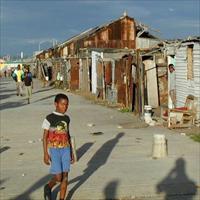SOUTH AFRICA: Wealth gap becoming a chasm

Despite the dismantling of apartheid in the early 1990s, and significant annual economic growth over the past 10 years, South African cities have the highest levels of inequality in the world, according to the UN Habitat's latest State of the World's Cities report.
The flagship report, published every two years, says even though local governments in the continent's richest country have adopted policies to fight poverty, efforts to bridge the gap between rich and poor have for the most part failed.
At the report's launch, UN-Habitat executive director Anna Tibaijuka said inequalities were not only increasing in South Africa's urban centres, but were also becoming more entrenched, "which suggests that failures in wealth distribution are largely the result of structural or systemic flaws".
"In Africa, urban income inequalities are highest in southern Africa," she said. "South Africa stands out as a country that has yet to break out of an economic and political model that concentrates resources."
Historically, the gap between the haves and have-nots has been vast due to the nature of the apartheid regime, which for decades enriched the country's white population at the expense of their black, coloured and Indian co-inhabitants.
Despite majority rule since 1994, the trend has continued. The Johannesburg Poverty and Livelihoods Study (JPLS), released by the Centre for Social Development in Africa at the University of Johannesburg last month, shone the spotlight on eight of the city's most deprived communities to highlight the gravity of their situation.
Two South Africas
Of the 1,409 households surveyed in the third quarter of 2007, just over half (51 percent) earned below US$230 per month, and one in five people had no income at all. This contrasts with the wealth of the northern suburbs, where behind high walls are swimming pools, private schools and German luxury cars parked in double garages.
According to Jean du Plessis, a housing and land researcher and former deputy director of the Geneva-based Centre of Housing Rights and Evictions, one of the legacies of apartheid has been the rapid urbanisation of South Africa's cities, which has contributed to current urban inequalities.
"Under apartheid the majority of South Africans were not allowed to move freely or to acquire secure land rights in urban centres. Once this inequitable system collapsed in the early 1990s, you had accelerated movement of black people from rural to urban areas. A further contributing factor has been a decline in subsistence agriculture," he said.
UN-Habitat figures show that South Africa's urban population is now at 58 percent, and of the total urban population, 33 percent are living in slums and squatter camps where basic service delivery is poor.
Du Plessis added that the challenge for local government has been: how do you deal with this massive influx of people in terms of providing housing, services and jobs?
"City mangers have focused on the provision of formal, subsidised housing as the solution, which is a long, slow and limited process. In the meantime, hundreds of thousands of families have ended up living in informal settlements, under constant fear of forced eviction," he said.
"In my view, the starting point should have been providing security of tenure to everyone needing a place to live in the cities, and to follow that up with intensive development support."
 Back and Next - Back and Next
Back and Next - Back and Next See Also - See Also
See Also - See Also